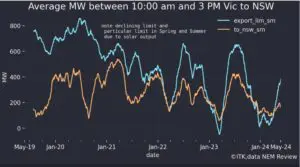The investor-led Climate Action 100+ initiative has released its first progress report, highlighting the role investors can play in the way companies prepare for climate change and mitigate their own contributions to global warming. And make money at the same time.
The Climate Action 100+ is designed to draw on the combined power of 370 investment funds with a combined $35 trillion of assets under management to pressure companies they are invested in to properly assess climate risk and develop plans for a carbon constrained future.
While the initiative has spurred companies to adopt targets for reducing greenhouse gas emissions, the investors have found it harder to shift company positions on government policy. The hardest task of all is to get companies to walk away from lobby groups advocating for a go-slow approach to government action on climate change.
Some investors will use their shareholdings to support through shareholder resolutions at company AGMs calling for climate action, but the Climate Action 100+ initiative has largely taken a direct approach to engage with senior company management.
The initiative has identified a global list of 161 companies, dubbed ‘systemically important emitters’, representing a mix of the world’s largest companies and with the largest carbon footprints, which investors then engage with to secure commitments to reduce emissions and invest in green initiatives.
Australian companies that have made the Climate Action 100+ target list include BHP, AGL Energy, Origin Energy, Qantas, Rio Tinto, Santos, Wesfamers and Woodside Petroleum.
Priorities for investor engagement with these companies include securing commitments to reaching zero net emissions, reforms to the way companies approach climate change related lobbying, and the implementation of the TCFD recommendations.
Generally, investors have sought to promote greater transparency of the financial risks posed by climate change to allow investors to make more informed decisions about the long-term viability of those companies.
Companies have faced growing pressure to take greater responsibility for the lobbying efforts of the industry groups they belong to, particularly if those groups are advocating against action on climate change.
For example, many of Australia’s largest resources companies are members of the Minerals Council of Australia, which was recently listed amongst the top 10 opponents to climate change policy, and these companies have faced calls to either push for changes in the Minerals Council’s approach to lobbying, or leave the council altogether.
But a survey of company positions compiled for the Climate Action 100+ initiative found that 90% of the target companies maintained memberships in lobby groups that actively lobbied against strong action on climate change.
The research completed by InfluenceMap also found that just a handful of companies had aligned their own lobbying efforts with policies required to meet the goals of the Paris Agreement.
Long term investors, like superannuation companies, are increasingly viewing climate change as a financial risk. It is an attitude that is being echoed by financial regulators, including the Australian Securities and Investment Commission (ASIC), which recently updated its guidance to company directors to include assessments of climate risks in company reports and prospectus.
“Given climate change threatens the ability of long-term investors to generate investment value and meet their investment objectives over time, the importance of the Climate Action 100+ initiative cannot be underestimated,” AustralianSuper’s ESG director Andrew Gray said.
“It’s real success has been in the way it has helped shape corporate priorities and put climate change at the centre of conversations on business strategy through engagement with such a large group of investors.”
In its first progress report, the Climate Action 100+ initiative found that 70% of the target companies have set long-term emissions reduction targets and that 90% have targets consistent with the Paris Agreement goal of limiting global warming to no more than 2 degrees above pre-industrial levels.
77% of the companies have allocated responsibility for their climate change strategies to their boards, and 40% have agreed to undertake and disclose climate scenario analysis.
“Climate change is a financial risk of unprecedented scale and impact,” CEO of the Investor Group on Climate Change Emma Herd said.
“Through Climate Action 100+ investors are telling companies it’s time to get serious about climate change. While more work is clearly needed to really drive company action, this report shows that engagement is having an impact and companies must listen to their shareholders.”
At its most recent annual general meeting, AGL Energy faced shareholder resolutions calling on the company to accelerate its transition out generating electricity with coal and re-aligning the company as a leader in clean energy technologies.
AGL is Australia’s largest emitter of greenhouse gas emissions, due to a generation fleet consisting of Australia’s largest coal-fired power stations. While the motions were ultimately unsuccessful, receiving around 30% shareholder support, the issue dominated the company meeting, with shareholders peppering the company’s board with questions about its position on climate change.













